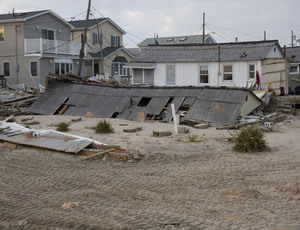The newly launched NYC Rapid Repairs program has attracted more than 2,000 contractors, Lou Coletti, president and CEO of the Building Trades Employers' Association (BTEA), which was one of the groups hosting contractor registration. This is "more than enough" for the program, which launched Nov. 9 and in recent weeks began sending teams of contractors to homes severely damaged by Superstorm Sandy.

The free city program, in partnership with FEMA, is aimed at helping residents, some of whom have had to abandon their homes, quickly make emergency repairs.
Under the initiative, the city sends teams of contractors to homes to permanently or temporarily restore heat, power and hot water, and make other "limited" repairs to protect a home against further significant damage, the city says.
"The highest priority will be to restore heat, electrical power and hot water to damaged homes. There will be no abatement or structural repairs, so [for example] Sheetrock will be removed where required but not replaced," Coletti says. "Pumping out of water, carpet and drywall removal and abatement are not included in the scope of services."
One of the lessons that contractors learned about recovery work after Sept. 11, 2001 was the importance of being indemnified from future lawsuits, Coletti says. Removing abatement work from the scope of Rapid Repairs reduces legal risks for contractors, he says. However, Rapid Repairs work does not include indemnification, he adds. "Contractors still have concern, but they are moving forward" with the program, Coletti says.
The city has hired six general contractors—Conti Group, Gilbane, Judlau Contracting, Navillus Contracting, Skanska Civil USA and Tutor Perini—to oversee the program in specific geographic areas. The GCs choose trade contractors from the 2,000 that registered, based on the scope of the work to be done, Coletti says. These firms are then sent to the Mayor's Office of Contracts for fast background checks, he says. Names of the vetted contractors are then given to the GCs, which put out bids and manage the program.
"Developing how to manage this program was very complex and difficult to get your arms around," Coletti says. For the city, part of that complexity was deciding how it would reimburse contractors for repairs, he says. It was eventually decided to pay prevailing wages, he adds.


Post a comment to this article
Report Abusive Comment